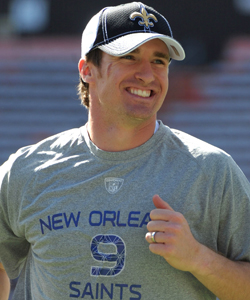He is one of the few active players who is respected by everyone in the room during this maddening process of rich versus richer. He's been smart, calm and rational. A leader. In a way, a secret weapon, and quite possibly, the greatest hope for a resolution. Then again, you'd expect no different from Drew Brees.
If DeMaurice Smith is the intellectual engine for the players' union in their battle against owners, one of the union's main emotional power sources has been Brees.
"He's one of the most important people in this fight," said a person with intimate knowledge of the negotiations. "He's among the toughest and the most liked. That's a great combination."
 | |
Drew Brees continues to be an intricate player in CBA negotiations. (Getty Images) |
When many players around the league have questions about the progress of the negotiations, they call Brees. When players want to vent, they call Brees, sources say, because they knew he'll talk them off the ledge. When calm is needed, Brees is the guy. When passion is needed, it's also Brees. When coordinated action is needed, it's Brees again.
A small window into Brees' role during these talks was seen in the now infamous recent bargaining session involving Brees, Peyton Manning, other union leaders, and a group of league executives and owners -- including Carolina’s Jerry Richardson. CBSSports.com was able to confirm many of the already public details including what was some ugly behavior by Richardson who acted like the ill-tempered soup jerk from Seinfeld.
("No CBA for you!")
When Richardson was highly condescending to Manning in one moment during the negotiating session it was Brees who helped restore calm, one source explained, to what was a rapidly deteriorating situation.
(Since that meeting, I'm told, Manning remains infuriated at how Richardson treated him though it's likely he'll never say so publicly.)
"It is hard. A lot of people, I think I've heard the phrase 'billionaires vs. millionaires.' The fact is it's business, especially when you talk about collective bargaining in general when you get into these agreements," Brees told the media recently. "This is a multi-billion dollar business. We’re approaching $10 billion in business annually in the NFL. There's a lot at stake and that there is absolutely an agreement to be reached that's fair for both sides. It's just a matter of reaching that. It just happens that this is played on a global scale, or at least just within the media a very public scale so that everybody is paying very close attention to this. It's the most popular sport in the country. No one wants to see this game taken away even for a small period of time. We all want to play."
Eye on Football
Brees and Manning are both students of NFL history. It seems neither is going to be Joe Montana. The last major labor action in football came in the late 1980s. It was brutal and ugly with the phrase "replacement players" becoming part of the sports vernacular. Some of the league's stars crossed the picket line, including Montana. He never truly supported the union and this contributed to an eventual fracturing of the players.
Trust me: Brees is aware of this. He wants as many of the league's star quarterbacks to be a centripetal force as possible. Indeed, he views this as almost a necessity to keep players together. He's probably right.
If the player stars are vocal and visible the union stands a chance. If star players defect (like Montana did) or are mostly silent, the union can fracture. That's what happened in the '80s.
Brees is a member of the union's executive board. He was one of the key players who organized the momentary player protest before season-opening game in September between the Saints and Vikings -- the players held up their index fingers following the national anthem as a show of unity.
Brees has been criticized in the past by former players like Conrad Dobler after Brees stated in a USA Today interview last year the reason for some of the issues facing former players is because of bad financial and personal decisions. Yet Brees also is apparently highly motivated by something that happened in his own backyard involving issues critical to those same past players.
Brees was furious that a House bill originally targeted the Saints and would've prohibited New Orleans players from filing workman's compensation claims in more liberal states like California. The bill later was amended to include claims from all Louisiana workers who are injured while working out of state.
Representative Cameron Henry, a legislator from Louisiana, said at the time of the bill’s proposal the Saints had requested he bring the legislation forward (the Saints are in his district). Brees wasn’t happy his own team did this.
There are plenty of smart and popular union players but it seems Brees is quickly rising near the top of that list. Which, if you know Brees, isn’t a terrible shock.



 4:26 a.m.
4:26 a.m.
0 comments:
Publicar un comentario